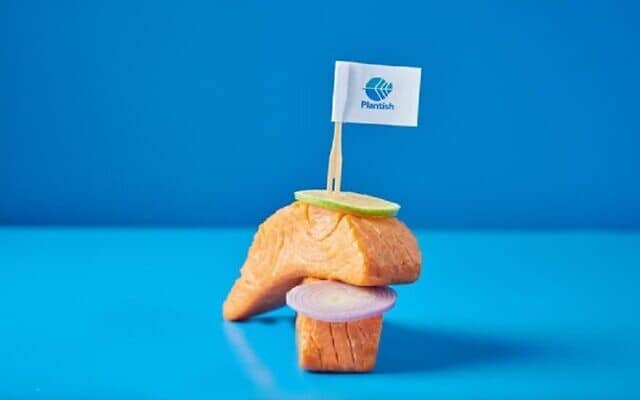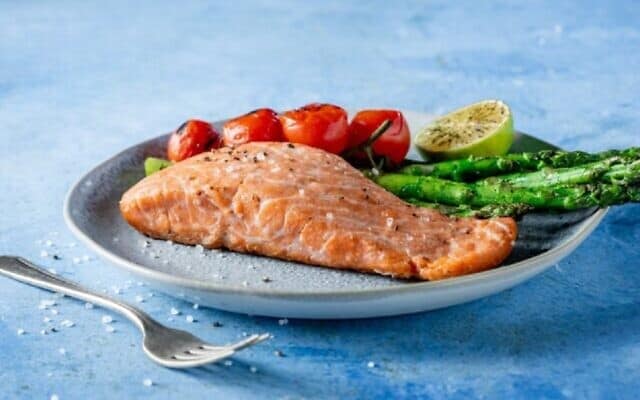Six-month-old food tech company, Plantish, says it made a fully structured, boneless cut with the same nutritional value as the fish, minus the mercury and toxins.
About the start-up
A new Israeli firm claims to have created the first plant-based whole-cut salmon fillet that mimics the appearance, taste, and texture of the real thing.
Plantish, a six-month-old firm, showed the prototype on Thursday, announcing that it was developing a patent-pending additive manufacturing method — the industrial term for 3D printing — to produce plant-based fish substitutes at a cheap cost and on a large scale.
Plantish, based in Rehovot, claims to have created a fully vegan, structured, boneless salmon fillet that has the same nutritional value as the actual fish — high in protein, omega 3 and omega 6 fatty acids, and B vitamins — but without the mercury, antibiotics, hormones, microplastics, and toxins that are commonly found in ocean or aquaculture species.
Because of client demand, the company stated it chose the complexity of whole-cut production over minced. Approximately 80% of fish ingested is whole-cut, either as whole fish or fillets.
According to the company’s statement on Thursday, the Plantish product may be cooked in the same ways that conventional salmon is.
Plantish, which was previously in stealth mode, was founded in mid-2021 by Ofek Ron, the former general manager of the Israeli organisation Vegan Friendly, who serves as CEO; Dr. Hila Elimelech, a chemistry PhD and expert in additive manufacturing processes who serves as head of R&D; Dr. Ron Sicsic, chief scientific officer; Dr. Ariel Szklanny, a bioengineering Doctorate who serves as cto; and Eyal Briller, a former

Plantish received a $2 million pre-seed round from TechAviv Founder Partners, an Israeli-focused fund that has backed firms like as drone logistics firm Flytrex and creative firm Nas Academy.
According to the business, its plant-based salmon product will be available in limited pop-up locations by the end of 2022, with an official launch scheduled for 2024.
According to a Good Food Institute report due out in June 2021, Plantish is one of 90 businesses worldwide engaging in the plant-based seafood market, with another dozen or so creating farmed seafood or fish created from animal cells.
According to market research firm IMARC Group, companies developing alternative fish and seafood products increased by 30% between 2017 and 2020, with further growth expected in the coming years as concerns about depleted supplies and overfishing grow and more firms transition from development to commercial launch.
Some are already well on their way. Mimic Seafood of Spain launched a tomato-based tuna product last year, while Ocean Hugger Foods of the United States launched a plant-based alternative to raw tuna and raw eel (for sushi) in 2019 with plans to focus on the United States and Europe this year in collaboration with Bangkok-based Nove Foods.
Plant-based crab cakes, shrimp, fish sticks, smoked salmon, and cod fillets are being produced by a variety of enterprises.

Large food corporations are also attempting to find success in the industry. Tyson Foods, a US meat corporation, purchased a minority share in New York-based plant-based shrimp developer New Wave Food in 2019. Thai Union Group, a Thailand-based seafood manufacturer that owns the Chicken of the Sea brand, developed OMG Meat, a plant-based meat range that includes crab cakes and fish burgers marketed to stores and restaurants, last year. Nestle will debut Vuna, a fish-free tuna product created with pea protein, in 2020. In addition, Cargill, an American global food business, announced a new range of plant-based items, including vegan scallops, with Japan-based convenience store chain Lawson in 2020.
According to the Good Food Institute report, the plant-based seafood market is still small in comparison to the plant-based meat industry, but sales in the coming years “could grow by $221 million if the category was able to capture the same share of the seafood market that plant-based meat has of the meat market.”


